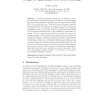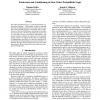37 search results - page 2 / 8 » A Tractability Result for Reasoning with Incomplete First-Or... |
CSL
2001
Springer
13 years 9 months ago
2001
Springer
Abstract. In classical approaches to knowledge representation, reasoners are assumed to derive all the logical consequences of their knowledge base. As a result, reasoning in the ï...
AAAI
1996
13 years 6 months ago
1996
First-order probabilistic logic is a powerful knowledge representation language. Unfortunately, deductive reasoning based on the standard semantics for this logic does not support...
IMCSIT
2010
13 years 2 months ago
2010
This paper describes an application for computing first-order semantic representations of English texts. It is based on a combination of hybrid shallow-deep components arranged wit...
IJCAI
2007
13 years 6 months ago
2007
We present a fully connectionist system for the learning of ï¬rst-order logic programs and the generation of corresponding models: Given a program and a set of training examples,...
ECSQARU
2009
Springer
13 years 11 months ago
2009
Springer
Partially preordered belief bases are very convenient for an eï¬cient representation of incomplete knowledge. They oï¬er ï¬exibility and avoid to compare unrelated pieces of inf...


